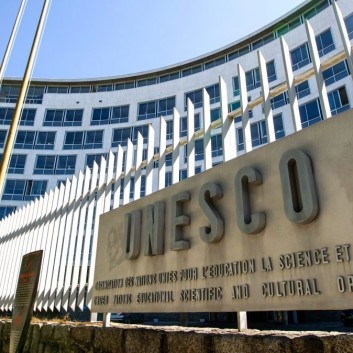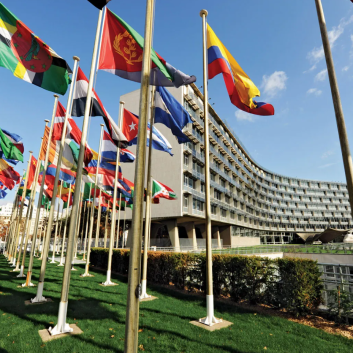UNESCO
유네스코(UNESCO)는 제2차 세계대전 직후인 1945년에 UN산하 전문기구로 창립되었다. 교육, 과학, 문화 등 지적 활동분야에서의 국제협력 촉진을 통하여 세계 평화와 인류 발전을 증진 시키기 위해 활동하고 있다.
유네스코는 ‘유엔교육과학문화기구(United Nations Educational, Scientific and Cultural Organization)’의 약칭이며, 프랑스 파리에 본부를 두고 있다.
유네스코는 국제사회의 주요 이슈 연구 및 대응 전략 수립, 국제 이슈에 대한 규범 마련, 지식 정보의 수집과 보급, 회원국 역량 강화, 국제 협력을 위한 촉매제 역할을 수행한다.
유네스코 헌장 (Constitution of UNESCO)
이 헌장의 당사국 정부는 그 국민을 대신하여 다음과 같이 선언한다.
전쟁은 인간의 마음속에서 생기는 것이므로 평화의 방벽을 세워야 할 곳도 인간의 마음속이다.
서로의 풍습과 생활에 대한 무지는 인류 역사를 통하여 세계 국민들 사이에 의혹과 불신을 초래한 공통적인 원인이며, 이 의혹과 불신으로 인한 그들의 불일치가 너무나 자주 전쟁을 일으켰다. 이제 막 끝난 무서운 대 전쟁은 인간의 존엄, 평등, 상호존중이라는 원리를 부인하고, 이러한 원리 대신에 무지와 편견을 통하여 인간과 인종에 대한 불평등이라는 교의를 퍼뜨림으로써 일어날 수 있었던 전쟁이었다.
문화의 광범한 보급과 정의, 자유, 평화를 위한 인류의 교육은 인간의 존엄에 불가결한 것이며 또한 모든 국민이 상호 원조와 상호 관심의 정신으로써 완수하여야 할 신성한 의무이다.
정부의 정치적․경제적 조정에만 기초를 둔 평화는 세계 국민들의 일치 되고 영속적이며 성실한 지지를 확보할 수 있는 평화가 아니다. 따라서 평화를 잃지 않기 위해서는 인류의 지적․도덕적 연대 위에 평화를 건설하지 않으면 안 된다.
이러한 이유에서 이 헌장의 당사국은 교육의 기회는 모든 사람에게 충분하고 평등하게 주어져야 하고, 객관적 진리는 구속 받지 않고 탐구 되어야 하며, 사상과 지식은 자유로이 교환 되어야 함을 확신하면서, 국민들 사이의 의사소통 수단을 발전 확대 시키는 동시에, 서로를 이해하고 서로의 생활을 더욱 진실하고 더욱 완전하게 알도록 하기 위하여 이러한 수단을 사용할 것을 동의하고 결의한다.
이에 헌장의 당사국들은 세계 국민들 사이의 교육적, 과학적, 문화적 관계를 통하여 국제연합의 설립 목적이며 또한 국제연합 헌장이 선언하고 있는 세계 평화와 인류 공동의 복리라는 목적을 촉진하기 위하여 국제연합교육과학문화기구(유네스코)를 창설한다.
Constitution of UNESCO
The Governments of the States Parties to this Constitution on behalf of their peoples declare:
That since wars begin in the minds of men, it is in the minds of men that the defences of peace must be constructed;
That ignorance of each other’s ways and lives has been a common cause, throughout the history of mankind, of that suspicion and mistrust between the peoples of the world through which their differences have all too often broken into war;
That the great and terrible war which has now ended was a war made possible by the denial of the democratic principles of the dignity, equality and mutual respect of men, and by the propagation, in their place, through ignorance and prejudice, of the doctrine of the inequality of men and races;
That the wide diffusion of culture, and the education of humanity for justice and liberty and peace are indispensable to the dignity of man and constitute a sacred duty which all the nations must fulfil in a spirit of mutual assistance and concern;
That a peace based exclusively upon the political and economic arrangements of governments would not be a peace which could secure the unanimous, lasting and sincere support of the peoples of the world, and that the peace must therefore be founded, if it is not to fail, upon the intellectual and moral solidarity of mankind.
For these reasons, the States Parties to this Constitution, believing in full and equal opportunities for education for all, in the unrestricted pursuit of objective truth, and in the free exchange of ideas and knowledge, are agreed and determined to develop and to increase the means of communication between their peoples and to employ these means for the purposes of mutual understanding and a truer and more perfect knowledge of each other’s lives;
In consequence whereof they do hereby create the United Nations Educational, Scientific and Cultural Organization for the purpose of advancing, through the educational and scientific and cultural relations of the peoples of the world, the objectives of international peace and of the common welfare of mankind for which the United Nations Organization was established and which its Charter proclaims.


